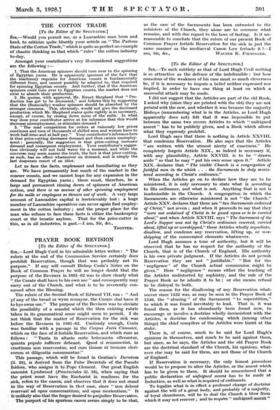PRAYER BOOK REVISION
[To the Editor of the SPECTATOR.]
Six,—Lord Hugh Cecil in his admirable letter writes : " The rubric at the end of the Communion Service certainly does prohibit Reservation, though that was probably not its purpose." If any will consult Bishop Cosin's Notes on the Book of Common Prayer he will no longer doubt that the purpose of the Revisers in 1661-62 was to show clearly what " the Curate shall have to his own use " and consequently may carry out of the Church, and what is to be reverently con- sumed after the Blessing.
The rubric of the Second Book of Edward VII. ran : " And yf any of the bread or wyne remayne, the Curate shal have it to hys owne use." The purpose of the Revisers was to obviate the possibility of a scandal which the then existing rubric taken in its grammatical sense might seem to permit. I do not think that the matter of Reservation for the sick was before the Revisers in 1661-62. Cinibusly enough, Cosin was familiar with a passage in the Corpus Juris Canonici, which on the face of it forbids Reservation, and which runs as follows " Tanta in altario mite holocatista offerantur, quanta poptdo Sufficere debeant. • Quod si rernanserint, in crastinum non reserventur, sed cum. timore et • tremore
corum et diligentia consumantur."
This passage, which will be found in Gratian's Decretum (ii. 28), is derived from the False Decretals of the Pseudo Isidcire, who assigns it to Pope Clement. Our great English canonist Lyndwood (Provinciales ill. 16), when saying that the priest must have the Eucharist in readiness for the sick, refers to the canon; and observes that it does not stand in the way of Reservation in that case, since " non debent reservari ad opus consecrantium, sed opui morientium." It is unlikely also that the forger desired to prejudice Reservation. - The purport of his spurious canon seems simply to be that,
as the care of the Sacraments has been entrusted to the ministers of the Church, they alone are to consume what remains, and with due regard to the laws of fasting. Is it un- reasonable to conclude that the rubric of our present Book of Common Prayer forbids Reservation for the sick in just the same manner as the mediaeval Canon Law forbade it ?—I






























































 Previous page
Previous page